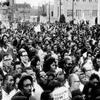Bob Garfield appears in the following:
Public Relations for Dictators
Friday, June 15, 2012
The New York Times reported this week that the Assad family employs Western PR firms to polish its image for the rest of the world. A few years ago, Harper’s contributing editor Ken Silverstein went undercover and approached PR firms as a fake representative of a tyrant who needed to improve his image. He talks to Bob about what he learned.
Minneapolis Police Filming Their Own Work
Friday, June 15, 2012
When demonstrators from the Minneapolis occupy movement posted video depicting what looked like a series of unprovoked arrests, the Minneapolis Police Department posted their own video showing several warnings to the crowd. Bob talks to incoming police chief Janee Harteau about the department's decision to post video of their own officers at large public events.
Reclaiming The Right To Petition
Friday, June 08, 2012
When protesters try to make themselves heard at this summer’s presidential conventions they’ll likely be penned by police some distance from the candidates. Law professor Ronald Krotoszynski argues in a new book that that’s a violation of the 1st Amendment, specifically the right to petition the government for a redress of grievances. He explains to Bob why protest is a form of protected speech and why proximity to the government officials you’re protesting is paramount.
Latin Playboys - Crayon Sun
Secrets That Aren't Secret
Friday, June 08, 2012
The White House announced this week that they’d killed Al Qaeda’s number 2 operative, but, following standard operating procedure, would not tell reporters how they'd killed him. Why? Because they killed him by targeted drone strike, a program which is widely known about but still technically classified. The New York Times reporter Scott Shane tells Bob that the administration's coy attitude towards classified secrets is stifling public debate.
Facebook May Allow Children to Join
Friday, June 08, 2012
This week the Wall Street Journal reported Facebook's plans to open up the social network to children under 13. As of now, preteens are not permitted to use the site, mainly because Facebook would have difficulty complying with COPPA, the Children's Online Privacy Protection Act -- the federal law regulating how companies can collect and use information about kids. Danah Boyd talks to Bob about COPPA's origins.
Fourtet - 128 Harps
Hollywood Goes to China
Friday, June 01, 2012
China is increasing its number of movie theatres and the number of American films that can be shown in them. And China is already the second largest market for American films in the world. So Hollywood is anxious to take full advantage of China’s potential and is busy making, and changing, its fare to appease the notoriously sensitive Chinese government. Bob talks to USC professor Stanley Rosen about what Hollywood's appeasement of China looks like at the movies.
When A Brand Becomes Too Successful
Friday, June 01, 2012
Aspirin, zipper, thermos, yo-yo -- even heroin was once a registered trademark. Today, they're generic product categories. Could the same happen to Google? It's already a recognized verb. Bob speaks with University of Michigan Law Professor Jessica Litman who says that though Google is unlikely to lose its trademark soon, there's a long history of 'genericide.'
New Country Rehab - Ramblin' Man
Covering Crowdfunded Video Games
Friday, June 01, 2012
This year has seen a wave of independent video game developers competing for attention and money on crowdfunding websites like Kickstarter. John Walker, one of the editors of the gaming criticism website Rock Paper Shotgun, talks to Bob about how he and his colleagues have opted to decide the fate of this field of hopefuls.
The Incredible Value of Live Sports
Friday, May 25, 2012
Live sports broadcasts account for a big part of your cable bill. Why? Because cable providers know they can count on sports to draw large audiences even as audiences shrink for other types of programming. Peter Kafka of the website All Things Digital returns to talk with Bob about the remarkable rise of ESPN and the importance of live sports to the cable ecosystem.
Is Online-Only TV Ready For Prime Time?
Friday, May 25, 2012
This year the Upfronts - the model that was once used by television channels to sell advertising and show off their slate of shows - was passed to a new platform – online. Digital programmers held the first ever event to show off their online programming, called the Newfronts. Bob talks to Sahil Patel, reporter for the online trade publication Cynopsis, about what the brave new world of online-only TV holds in store.
Chaos Scenario Revisitied
Friday, May 25, 2012
Back in 2005, Bob explained his Chaos Scenario about the future of media--including TV. Now, he reflects back on predictions he made and the status of television viewing today.
Baba O'Riley - The Who
TV Hijackers
Friday, May 25, 2012
On a Sunday evening in the late 1980's, two or more unknown men hijacked the signal for two Chicago area TV stations. They broadcast a spooky, subversive, disturbing message -- twice. Brooke talks to Bohus Blahut, a Chicago broadcaster, who saw the broadcast and was unable to forget it.
Doctor Who Theme - Delia Derbyshire/Ron Grainer
Will We Ever Watch TV Together Again?
Friday, May 25, 2012
Web TV services, DVRs, and on-demand TV encourage us to ignore the broadcast schedule and watch at our convenience. So what will become of the experience of watching the same show at the same time as your friends? Bob sits down with David Carr, media critic at the New York Times and Matt Zoller Seitz, New York magazine's TV critic, to see if the water cooler will evolve or perish.
A New (Troubling) Speech Law in Libya
Friday, May 18, 2012
With the first Libyan elections in 40 years just a month away, the shadow of the Gaddafi regime looms large. The National Transitional Council (which holds power in Libya until those elections) recently passed a law that criminalizes glorifying Gaddafi as well as offending the revolution. Bob speaks with Libya Herald editor Sami Zaptia about the implications of the law for speech in Libya.
Germany Publishes "Mein Kampf"
Friday, May 18, 2012
On January 1, 2016 one of the most infamous books of the 20th century, Mein Kampf, will go into the public domain and will be published in Germany for the first time in 70 years. German media professor Nikolaus Peifer explains to Bob how Germans are trying to manage and contextualize the book’s release in order to minimalize its impact.
Remembering Barney Rosset
Friday, May 11, 2012
In 1951, Grove Press was a tiny, almost-defunct publisher with just three titles in its catalog. But then Barney Rosset took over and, with a few choice books, helped push America past its Puritanical roots and into the sexual revolution. His memorial was held this week – he died a few months ago at the age of 89. In an interview from 2008, Brooke talks to Rosset about fighting charges of obscenity over books like Naked Lunch and Tropic of Cancer.
An Apology for Reporter Edward Kennedy
Friday, May 11, 2012
This week Tom Curley, the president and CEO of the Associated Press, apologized on behalf of the AP for the way the organization handled the firing of a reporter named Edward Kennedy. In 1945, Kennedy broke a US government embargo and filed a story about the German surrender in Europe. Bob speaks with Curley about why he decided to apologize now, 67 years after Kennedy was dismissed.
The AP (Temporarily) Holds a Big Story
Friday, May 11, 2012
Early this week, the Associated Press broke the story that the US government had stymied an attempt by a Yemini Al-Qaeda group to blow-up a US bound plane. It was a huge scoop, but at the government’s request the AP sat on the story for several days. Bob speaks with AP reporter Matt Apuzzo about the decision to hold the story, and the decision to publish it.
The Phony Statistic About College Graduates
Friday, May 11, 2012
There's a surplus of statistics about how tough the economy is on kids currently graduating from college. But one statistic says that 85% of graduates - "the Boomerang Generation" - return to live at home with their parents. That figure is wrong, says Louis Jacobson, who tracked down its source for Politifact.com. He talks to Bob about where it came from, and why it circulated for two years.
5 Ways To Spot a B.S. Political Headline in Under 10 Seconds
Friday, May 11, 2012
An avid political junkie and a thoroughly scarred presidential campaign watcher, Jason Pargin set out to save his fellow man. He wrote ‘5 Ways to Spot a B.S. Political Story in Under 10 Seconds’ and he explains to Bob how he came by his expertise the hard way.



















